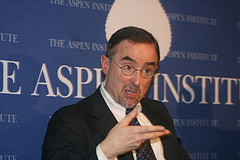A few thoughts about Michael Kinsley’s much-criticized New York Times review of Glenn Greenwald’s book “No Place to Hide,” an account of his role in the Edward Snowden leaks.
Kinsley is technically correct in asserting that the government has — and should have — the final word when it comes to deciding whether secret information should be made public. Thus I part company with the likes of Gawker’s Hamilton Nolan, who, in a post headlined “Michael Kinsley Comes Out Against Journalism,” fulminates: “Michael Kinsley does not believe that a free press should be allowed to [expose official secrets]. He believes that the decision to tell government secrets ‘must ultimately be made by the government.'”
It’s Nolan’s “should be allowed” that bears scrutiny. In fact, the Supreme Court has made it clear that the government may act to prevent secrets from being revealed if those revelations would cause a serious breach of national security. Here is how the Court put it in the 1931 case of Near v. Minnesota:
No one would question but that a government might prevent actual obstruction to its recruiting service or the publication of the sailing dates of transports or the number and location of troops.
The government may also prosecute both leakers and journalists post-publication, as a majority of the Court all but invited the Nixon administration to do in the Pentagon Papers case — and as Harvey Silverglate explains in this 2006 Boston Phoenix essay.
If you think about it, how could it be otherwise? It’s so easy to conjure up scenarios involving nuclear weapons, terrorism and the like under which censorship and prosecution would be justified that it’s not even worth the effort to spell them out (although Chief Justice Charles Evans Hughes tried to do just that in Near).
But I emphatically part company with Kinsley over his sneering, dismissive tone, and his shocking failure to understand the role of a free press (or even a press that’s not quite as free as Hamilton Nolan imagines) in a democratic society. Because if the ultimate authority rests with the government, there are nevertheless times when leakers, individual journalists and the institutional press must stand up to the government and risk its wrath in order to serve the public interest. That’s what The New York Times and The Washington Post did in publishing the Pentagon Papers, the government’s own secret history of the Vietnam War.
And I would argue that that’s what Snowden, Greenwald, Barton Gellman (curiously absent from Special Agent Kinsley’s arrest warrant), The Guardian and The Washington Post did in exposing the NSA’s practices.
I wrote more about the legal background for The Huffington Post last June.
Photo (cc) by the Aspen Institute and published under a Creative Commons license. Some rights reserved.


